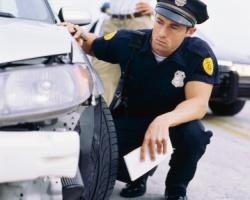Your youth wouldn’t get in a car with the driver drunk, and your youth would say something should they encounter a friend who is over the legal limit, which for them is zero. Your youth never would drive recklessly, either. Careful, diligent, mature youth tend not to make poor decisions. However, just in case this doesn’t describe your youth, here’s some insight you can lend them.
I regularly run the isolated road leading up Fairmont Ridge, and I was at the top and coming down when I heard trouble on the highway behind me. Before the car passed me I knew there was trouble because I could hear the car accelerating as it came over the top of the hill, and the late model white Honda Accord blew past me and headed down the straight of the hill. I drive this hill at 35, and that Accord was doing 50 at the top of the hill and was still accelerating.
Going downhill, the Accord then locked its brakes and tried to make the left turn at the end of the straight. I ran down the hill. When I made the left turn, I saw the Accord upside down with three boys crawling away from it.
FYI: The first act you do in this instance is check to see if there are any other people in the car. The second act you do is double-check and see if there are any other people inside the crumpled car as they are hard to spot. The third act you do is ask someone who was in the car how many were in the car, and then go back and look–if the car is not on fire–to see if there’s anyone still in the wreckage.
That done, and with no one left in what was a beautiful car, I turned my attention to the three boys, still sitting on the ground because I told them they were in no position to stand up. Two of the boys weren’t speaking, emotionally shocked, but not seriously injured. The third person, the almost-17-year-old driver, could talk.
The driver wanted to make sure his friends were OK, and they were. He asked for and received permission from me to crawl over to see them himself. Yeah, they will be OK. The initial trauma of this car wreck over, the driver looked not at me but straight ahead. He thought.
There were no bystanders and no emergency personnel yet on the scene. The driver, his two passengers and I were on the dirt median, assured that medically we will be fine. I had much to do, but there were a few seconds when the driver could voice his priorities at this critical moment.
He said, not in panic, not relief, not gratefulness, not concern about medical conditions or the car, but with the defeated tone as one waiting in the Vice Principal’s office: “I’m in trouble.”
Reflecting back on these words years later, maybe it’s not that unusual for a good kid to say these words before the highway patrol, paramedics and ambulances arrive. For the driver, there was first the earnest need to know his guys were safe, then there was this self-condemnation that hurt more than totaled cars or medical misdemeanors.
It doesn’t have to be drunk driving, but youth group teens can be especially prone to recklessness of poor decisions that leads maybe not to physical or financial condemnation, but spiritual and emotional. The apostle Peter knew this dynamic too well. Denying that he knew Christ, Peter reacted to his own poor decision.
“Then seizing Him, they led Him away and took Him into the house of the high priest. Peter followed at a distance. But when they had kindled a fire in the middle of the courtyard and had sat down together, Peter sat down with them. A servant girl saw him seated there in the firelight. She looked closely at him and said, ‘This man was with Him.’ But he denied it. ‘Woman, I don’t know Him,’ he said. A little later someone else saw him and said, ‘You also are one of them.’ ‘Man, I am not!’ Peter replied. About an hour later another asserted, ‘Certainly this fellow was with Him, for he is a Galilean.’ Peter replied, ‘Man, I don’t know what you’re talking about!’ Just as he was speaking, the rooster crowed. The Lord turned and looked straight at Peter. Then Peter remembered the word the Lord had spoken to him: ‘Before the rooster crows today, you will disown me three times.’
And he went outside and wept bitterly” (
It’s the last verse that changes us. We know of the car wrecks and the horrible mistakes, but with the almost-17-year-old and with the Apostle Peter, beyond the physical and financial hurt, the realization of our responsibility is a cold shower on a winter morning. Peter enjoyed the incredible privilege of learning directly from Jesus, only to deny Him. The almost-17-year-old was given keys to a nice car.
Disappointing those who love, invest and then trust us evokes the powerful emotion of remorse displayed by Peter and the teenager driver. Peter would be redeemed by Christ and go onto world-changing ministry; the teen driver, I’m convinced would have good parents. There would be accountability but also much grace.
But for Peter and the teen driver, they didn’t give themselves grace in the stark reality of poor decisions. I suspect most youth would react as, or at least relate to what the almost-17-year-old said and felt. Poor decisions make all of us feel the way Peter and the teen driver felt.
Temptations abound behind the wheel, at the party, alone with the girlfriend, or in denying Christ. It’s just not worth it.




